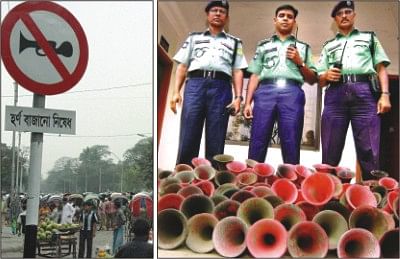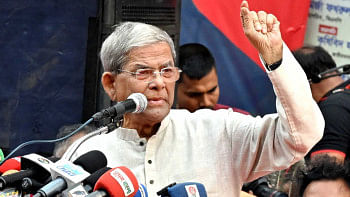Just 'Don't Honk' sign not enough

L-R: There are 'Don't Honk' signs at major city intersections, near hospitals and schools, but horn-happy motorists are heedless to the warning because of poor enforcement of law, while hydraulic horns seized from vehicles a few months ago.Photo: STAR
Indiscriminate and unnecessary use of powerful vehicular horns continues to create noise pollution in the city due to lack of enforcement of the existing horn rules.
According to experts, vehicular horn is the primary source of noise pollution in the city.
Research reports from World Health Organisation (WHO), Unicef and World Bank (WB) say noise pollution is one of the 12 environment pollutants that cause 30 serious diseases. They can range from loss of hearing to problems with unborn babies.
There are laws to fight the noise polluters including the horn-happy motorists. But there has been no sign of any efforts to implement the laws.
''Don't Honk'' signs were installed earlier last month at some major city intersections and a number of VIP streets. The purpose, traffic policemen said at the time, was to remind motorists that there is a law against unnecessary honking.
The idea was to implement the Motor Vehicles Ordinance of 1983 that forbids honking within 200 yards of places of worship, educational institutions, hospitals and courts.
Uniformed law enforcement officers equipped with signs, leaflets and stickers with 'no unnecessary honking' slogans launched a campaign against honking.
They showed the signs to the motorists, handed out the leaflets to drivers and pedestrians, and pasted the stickers on passing vehicles.
They also removed hydraulic horns from city buses, seized vehicles and filed cases against 59 cars, taxicabs, buses, lorries and autorickshaws for excessive honking. Another hefty number of motorists was let off with harsh warnings.
The message of the campaign was loud and clear -- to remind motorists that there is a law against unnecessary noise and that the authorities are ready to enforce the law.
"The idea was to create awareness among general people -- to pass the message that noise pollution is harmful to the human senses," said Billal Hossain, a deputy director at the Department of Environment (DoE) and the top official regarding noise pollution. "We want to alert motorists before going all-out against the honkers."
"We also went into action against a number of offenders to demonstrate that we are ready to enforce the laws when necessary," he said.
However, as the campaign ended, much of the fanfare and awareness died down.
Dhaka residents say they do not feel the difference in noise quality despite the recent clamp down on horn-happy motorists.
The city still has red-white-and-blue signs and banners threatening a Tk 200 penalty. However, it is alleged that in most cases the honkers pay Tk 100 or less and the fines are usually kept off the record by traffic policemen.
"I dislike the use of horns. In fact, I scold my chauffeur all the time for excessive honking," said Shahan Ara, a housewife from Mohakhali. "I am aware that horns are prohibited in many streets. So, most of the times, I tend to hold my breath fearing that a traffic police would stop my car for honking. But it never actually happens."
However, traffic policemen say thousands of cars are being fined for honking in the city every day.
"On an average, around two thousand cars are fined every day in the West (Tejgaon) zone alone," said a traffic sergeant on duty at the Kazi Nazrul Islam Avenue. "I cannot deny that majority of vehicles get away with honking. But, given the sheer number of cars honking unnecessarily, it is not possible to fine every car during rush hours."
In the city, millions of people -- especially children -- are exposed to unabated noise pollution, which is worsening rapidly due to new vehicles fitted with powerful horns. Hydraulic horns are banned, but 'normal' horns of smaller vehicles are also harmful.
A random survey shows that most private vehicles are fitted with two powerful horns. Children can sustain a permanent hearing damage if exposed to the piercing sound of these horns from a closed proximity.
Even traffic sergeants complained of loss of hearing ability.
Sergeant Shafiur, who joined the police department only a year ago, told this correspondent that he has already become short of hearing.
"Almost all traffic policemen are short of hearing given the amount of time they spend amid the frenzied street chaos and all the honking," he said.
The Department of Environment (DoE) in 2006 finalised a set of rules against noise polluters. But to everyone's surprise, it did not incorporate the biggest polluter -- vehicular horns -- into the new set of rules.
The new rules were incorporated in Environment Conservation Act of 1995 and gazetted on September 3, 2006 by the Ministry of Environment and Forest.
DoE's activities and responsibilities seem to be limited to formulating rules only as there has been no sign of any effort to implement the newly gazetted rules.
Under clause No. 139 of the Motor Vehicle Act, 1983, police can prosecute anybody using 'hydraulic horns'. But the fine is so small that the offenders care little about it.
Sergeant S Kabir said the police should have portable equipment to measure the decibel level and prosecute offenders accordingly.
"We are aware of it. We know the damage noise pollution can do to people," he said. "We try to make the situation as convenient as possible, but it is not always possible due to the chaotic transport system in the city."

 For all latest news, follow The Daily Star's Google News channel.
For all latest news, follow The Daily Star's Google News channel. 



Comments